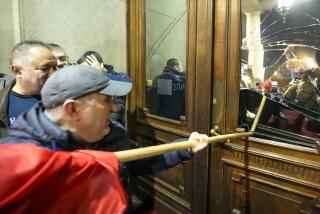Milosevic Allies Cut Off Negotiations on Reworking Serbiaâs Government
BELGRADE, Yugoslavia â As Yugoslav President Vojislav Kostunica struggled to solidify power amid political bickering and the threat of a backlash by rogue police units, allies of ousted leader Slobodan Milosevic broke off talks Tuesday on handing over control of Serbiaâs government.
The Socialist Party--which is still led by Milosevic, who reportedly remains in one of his homes in Belgradeâs affluent Dedinje neighborhood--said no further dialogue can be possible until âafter the end of riots, violence and lawlessness against the citizens of Serbia,â an apparent reference to attacks on backers of the old regime.
The Serbian Radical Party also pulled out of the negotiations to dissolve Serbiaâs parliament and executive branch and to hold elections in December. The partyâs leader was pelted by rocks Monday night by Kostunica supporters.
The two parties hold the majority of seats in the parliament of Serbia, the larger of Yugoslaviaâs two republics. Even though Kostunica is Yugoslav president, he needs control of the more constitutionally powerful Serbian government to bury the Milosevic regime for good.
The dispute over dissolving the parliament and setting up an interim government has come as hundreds of Kostunicaâs supporters have taken the law into their own hands. Each day, angry workers force out unpopular Milosevic-era managers at state-run companies and seize control of key institutions, such as those in the media.
Kostunicaâs 18-party alliance acknowledged the abuses, releasing a statement that called on employees and managers to âprotect property and prevent various abuses.â
The executive committee of Milosevicâs Socialist Party in turn said it would not accept dismissals of key personnel in state-run companies and institutions âthat were carried out through threats, lawlessness and violence.â
But the party also admitted it continues to suffer defections to the new ruling alliance. Kostunica came to power last week after street protests forced Milosevic to recognize defeat in the Sept. 24 presidential election and give up power after 13 years of harsh and sometimes destructive rule.
While momentum is clearly in Kostunicaâs favor, rumblings of popular discontent over high prices and shortages of basic food items were causing concern Tuesday among the ranks of his followers. Western governments know that with a new round of elections in Serbia expected Dec. 17, Kostunica doesnât have long to show that he can improve ordinary peopleâs lives.
On Tuesday, French Foreign Minister Hubert Vedrine brought good news to Kostunica in Belgrade, the capital of Yugoslavia and Serbia.
Delivering about $2 billion in aid to Yugoslavia will be Europeâs top priority, said Vedrine, whose country holds the rotating presidency of the European Union.
Meanwhile, as Kostunica pushes for a change in the makeup of the Serbian government, his alliance is trying to pressure Milosevic allies into retreat with the best weapon it has: a threat to call huge numbers of protesters back into the streets.
Kostunica is insisting that one of his alliance leaders take charge of the powerful Serbian Interior Ministry, which controls law enforcement in the republic. The police forces are split between loyalists to Milosevicâs dying regime and Kostunicaâs promised new democracy.
There can be no compromise on that, said Nebojsa Covic, one of the new presidentâs top lieutenants, who insisted that the alliance needs control of the ministry.
Asked on Tuesday who was in control of the police, Covic replied, âEverybody and nobody.â
Zoran Djindjic, another key Kostunica aide, said the dreaded secret police--which Milosevic built up as a personal defense force--were continuing their surveillance operations, and not for Kostunica.
Electronic eavesdropping is again occurring, Djindjic said. There are attempts to consolidate the secret police, he added, but the new government could not order arrests without legal authority.
In another sign of potential trouble on the horizon, Kostunica made it clear Tuesday that Bernard Kouchner, head of the United Nations mission administering Kosovo, is not welcome in Belgrade.
Kosovo has been under U.N. control since June 1999, when a 78-day air campaign by the North Atlantic Treaty Organization forced Yugoslav troops to withdraw and paved the way for peacekeeping troops to occupy the southern Serbian province. The provinceâs ethnic Albanian majority wants independence, but Kostunica has vowed to reassert Yugoslav sovereignty.
Denying that Kouchner had been invited to meet Kostunica in the Yugoslav capital, the presidentâs office accused the U.N. official of failing to implement Security Council Resolution 1244. The measure, which provides the legal authority for the peacekeeping mission in the province, states that Kosovo remains part of Yugoslavia.
Kostunica accused Kouchnerâs administration of doing nothing to enable the return of Serbian refugees to the province, as it is required to do under the U.N. resolution.
Also Tuesday, Kostunica visited the Kolubara coal mines south of Belgrade to thank 7,000 miners whose strike helped bring down Milosevic.
âWithout you,â Kostunica told the miners and their families, âit is a big question whether any of this would have been possible.â
*
Associated Press contributed to this report.
More to Read
Sign up for Essential California
The most important California stories and recommendations in your inbox every morning.
You may occasionally receive promotional content from the Los Angeles Times.










